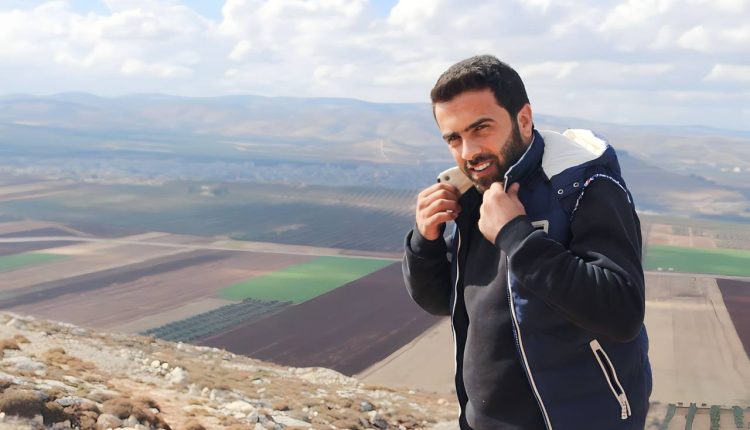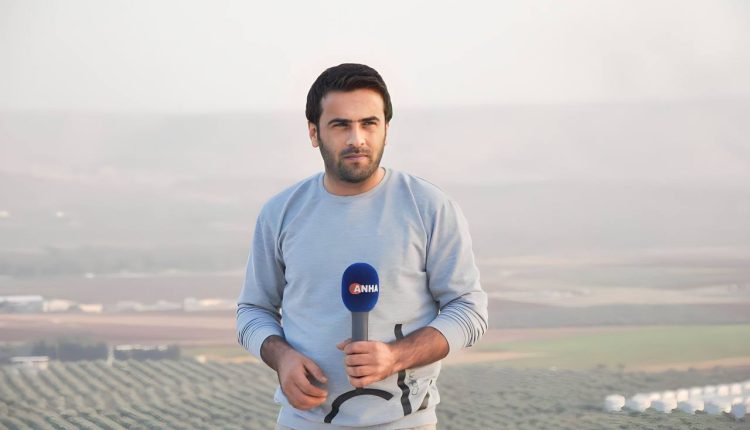There are fears that Syrian journalist Suleiman Ahmed is being subjected to “pressure” that will force him to confess to things he did not commit that may result in penalties being imposed on him or that fake cases will be “fabricated” against him, according to his press organization, his lawyer, and the organizations following the case.
On October 25, Suleiman Ahmed, 35, a news editor in the Arabic section of the Rozhnews Agency, was arrested at the Fishkhabur (Semilka) Syria-Iraqi Kurdistan Region IKR border crossing, while returning from northeast Syria to the IKR. He disappeared for five days before the Dohuk Asayish (security) announced Ahmed is detained by them.
Ahmed is originally from the Syrian city of Afrin, and has been residing legally in the IKR since 2018. In October 2023, he returned to his hometown to participate in his father’s funeral, and was arrested during his return to the Duhok Northern Province.
Dohuk Seucirty forces did not mention in its statement the charges against Ahmed as a journalist and indicated that the Asayish forces “arrested a member of the Kurdistan Workers’ Party (PKK) who was moving between Rojava (Kurdish region of Syria) and the Kurdistan Region for secret and illegal tasks, so he was arrested.”
The statement stressed that Suleiman Ahmed “confessed during the investigations and will be trialed as the court will deal with him in accordance with the law."
The Asayish statement came after the Rojnews - an institution licensed by the Kurdistan Regional Government KRG- announced in a statement the disappearance of journalist Suleiman Ahmed and accused the security forces of the Kurdistan Region of arresting him.
Rojnews Agency says on its website that they belong to Chatr Publishing Company and publish their articles in Kurdish (both Sorani and Kurmanji dialects) and Arabic languages. The concessioner is Hasan Hama Raza and they are licensed by KRG.
No one tells us per which legal article Suleiman Ahmed was arrested
Botan Garmiani, editor-in-chief of the Rojnews website based in the city of Sulaymaniyah, told (KirkukNow), “No one tells us per which legal article Suleiman Ahmed was arrested, so that we know what measures we must take.”
“We informed all the relevant organizations, the Syndicate of Journalists and the regional government. We officially addressed the Fish Khabour border crossing, but no party expressed its willingness to reveal where he is detained," he added.
Roj News appointed two lawyers to take over Suleiman Ahmed’s case, but they were unable to meet with him even though a month had passed since his arrest.
The editor-in-chief of Rojnews fears that the security forces in Duhok will force Ahmed to sign false confessions “under torture” and stressed that “they do not have any evidence and are seeking to fabricate false evidence incriminating Suleiman Ahmed.”
Nariman Ahmed, one of the two lawyers assigned by the Rojnews Foundation to take on Suleiman Ahmed’s case, explained that Ahmed was moving legally between Rojava and IKR.

There are concerns that Sulaiman Ahmed is detained for political not legal reasons. Roj News
“He has official residence permit in the Kurdistan Region, and he had no problems while he was going there, but during his return he was arrested by Asayish at Fish Khabour port, then he was transferred to Asayish Dohuk.”
“After his arrest, we visited the General Asayish of Dohuk to take over the case and follow up on the file. There, they asked us to complete the legal procedures so that we could meet him, so we were sure that he is detained there but despite that, Asayish Dohuk officials did not acknowledge that he was in their custody,” according to Nariman Ahmed.
After the Asayish statement confirming that Ahmed was under their custody, the lawyer approached the investigating judge in the Asayish Dohuk to allow him to meet Suleiman Ahmed and take over the case as a lawyer.
"The judge agreed to the meetation request (the document is preserved by KirkukNow), but officials in Dohuk Asayish ignored that official document and did not allow either Suleiman or me to see the case that was registered against him."
For this reason, Nariman Ahmed, according to the law, has not officially taken up the case yet.
The Asayish told us that we cannot meet him and obtain a power of attorney from him before the end of the investigations, even though this is against the law
“The Asayish told us that we cannot meet him and obtain a power of attorney from him before the end of the investigations, even though this is against the law,” Nariman Ahmed added.
According to the Principles of Criminal Trial of 1973, the suspect has the right to appoint a lawyer and meet him after 24 hours without classifying the charge against him, so that he can obtain legal advice from him, whether before or during the investigation.
“Suleiman Ahmed did not commit a crime, and the only thing he may have been arrested for was his movement between the Kurdistan Region and Rojava, and this is completely legal,” according to Ahmed.
Over the course of a week, KirkukNow called the director of the Dohuk Asayish, Zervan Baroshke, at least three times. On November 19, a text message was sent to him via mobile explaining the reason for contacting him, but he did not respond up today.
Nazaket Hussein, head of the Journalists' Defense Committee of the Kurdistan Journalists’ Syndicate, denied knowledge of the case and told (KirkukNow) reporter, "I heard about it from you and the media, but we do not have any information about it."
“No one contacted us. We cannot follow up on the case unless the journalist himself, or the institution he works for, or at least one of his friends asks us to follow up on the case,” Hussein explained.
"Any journalist who turns to us, even if he is not a member of our union, we follow up on his case," she added.
This comes at a time when Botan Garmiani, editor-in-chief of Roznews, confirmed that he had informed the Journalists Syndicate.
The Community Peacemaker Teams CPT, an international human rights organization headquartered in the United States of America which follows up on issues related to freedom of expression in Colombia, Canada, Mexico, Iraq and the West Bank, said it is currently following up on the case of journalist Suleiman Ahmed.
Kamran Othman, a member of the CPT’s Iraqi Kurdistan team, told (KirkukNow), “According to our information, Suleiman Ahmed was accompanied by a person holding Egyptian nationality during his arrest, and the visa on which he traveled was written that Suleiman works for a Canadian company in Sulaymaniyah, because he obtained the visa this way.”
He would be framed for committing forgery, tried, and imprisoned for a period of time on this charge
The member of the CPT did not hide his fear that “he would be framed for committing forgery, tried, and imprisoned for a period of time on this charge.”
“In the case of Suleiman Ahmed, violations occurred because the Dohuk Asayish revealed his presence with them five days after his arrest, under pressure from the media,” Othman says.
"According to our follow-ups, Suleiman was constantly moving through Fishkhabour. If he had a connection to the Kurdistan Workers' Party, as the Asayish claim, why did they not arrest him before? Knowing that there is not yet a law that stipulates the arrest of people who have a connection to this party," he added.
The local and international organizations, human rights advocates members of the Iraqi and Kurdistan parliaments MPs continuously express their grave concern that the journalists and the freedom of press are increasingly under threat all over Iraq including the Iraqi Kurdistan Region IKR.
From April 2022 to the end of last March, 86 cases of violations were committed against journalists in both Erbil and Sulaymaniyah northern provinces, according to a report by the Democracy and Human Rights Development Centre (DHRD).
Diyari Muhammad, Director of the Metro Center for the Defense of Journalists, said in a press conference held on October 31, 2023 in the city of Sulaymaniyah, “The way Suleiman Ahmed was arrested, his disappearance and then being accused of belonging to an armed group, created fears in our minds that Suleiman Ahmed’s case would be dealt with the same as the case of Badinan journalists.”
Badinan detainees, few of them tried and freed up today, are victims of a wave of arrests carried out by the Kurdish security forces Asayish since June 2020 in response to a series of major protests against delay in salaries of state employees, the KRG handling of the economic crisis resulting from disputes with Baghdad over oil production, export and corruption, and reached its peak under the Covid-19 pandemic.
The freelance reporter Sherwan Sherwani and four other activists and journalists were arrested in 2020 and convicted guilty of disturbing national security of the IKR by Erbil criminal court on February 16, 2021.
Guhdar Zebari, a freelancer from Duhok, has been sentenced to six months in prison last October for the third case of illegal possession of weapon after being accused of possessing an illegal weapon in a trial was held in Erbil, capital of the semi-autonomous IKR, while it was scheduled to release him on August 16.
Before fully serving his sentence in March 2023, Guhdar was sentenced to five months in prison on the background of another case. He was accused of changing the plate number of his vehicle without official approval when arrested.
The editor-in-chief of Roznews believes that the arrest of Suleiman Ahmed is an extension of the campaign launched by the KRG to suppress free voices.





